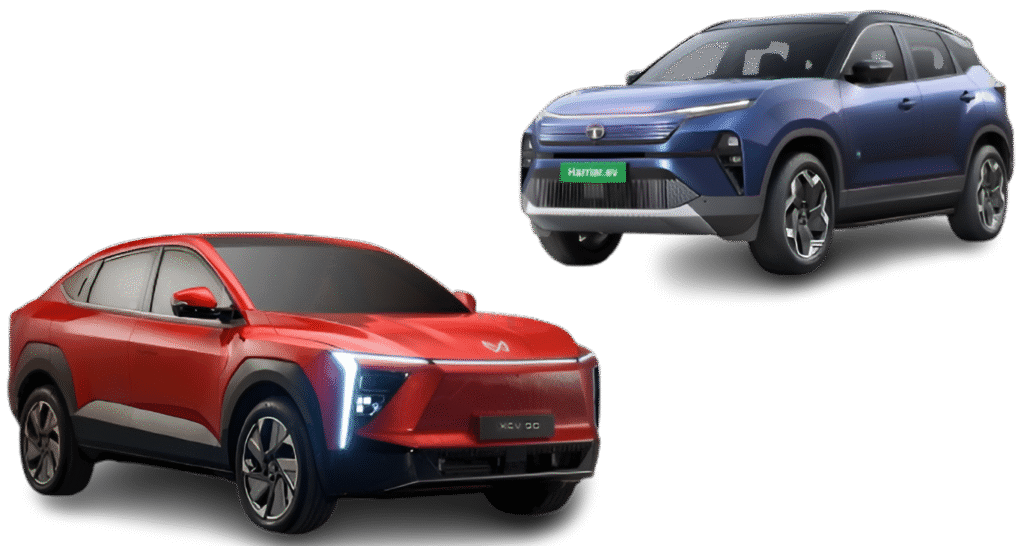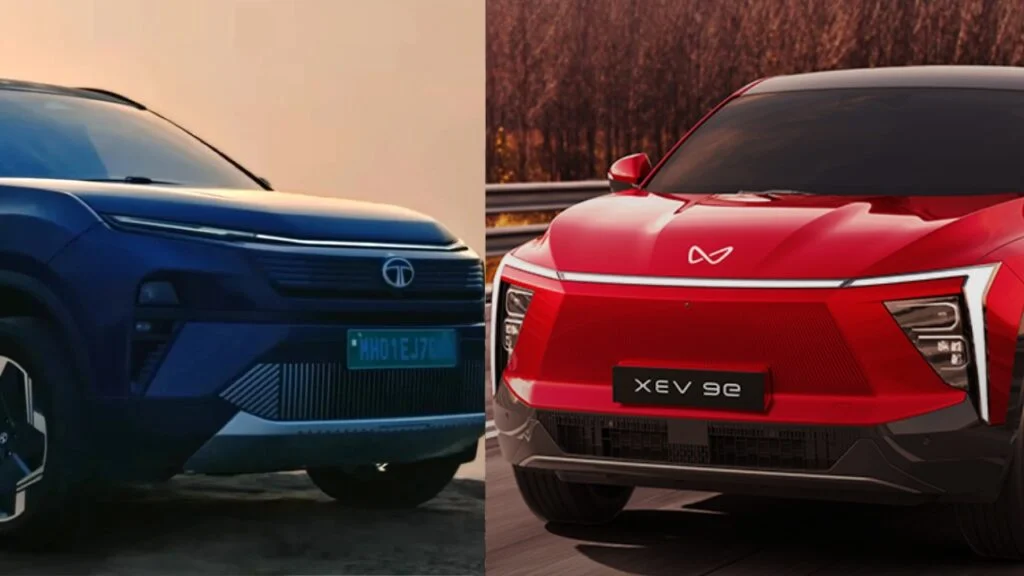
1. 🏁 Design & Dimensions
Exterior Design
- Tata Harrier EV (Electric Vehicle) follows the rugged SUV, commanding design of its ICE sibling, featuring a closed grille, bold bumpers, and aero-optimized alloys. It retains a conventional SUV silhouette, projecting robustness and ruggedness.
- Mahindra XEV 9e, built on the INGLO dedicated EV “skateboard” platform, flaunts a sleek coupe‑SUV profile with flush door handles, a panoramic roof, and futuristic LED lighting extending across the rear.
Verdict: The Harrier EV appeals to traditional SUV lovers, while the XEV 9e draws attention with bold, contemporary styling.
Size & Cabin Space
| SUV | Length (mm) | Width (mm) | Height (mm) | Wheelbase (mm) | Boot / Frunk (L) |
|---|---|---|---|---|---|
| Harrier EV | 4,607 | 2,132 | 1,740 | 2,741 | 502 L + 67 L |
| XEV 9e | 4,789 | 1,907 | 1,694 | 2,775 | 663 L + 150 L |
- XEV 9e is notably longer with more cabin space and nearly double the frunk capacity—ideal for luggage-heavy families.
- Harrier EV is wider and taller, lending a more commanding presence, though roomier seating aligns closely.
2. ⚡ Powertrain, Performance & Range
Battery & Output
- Harrier EV offers 65 kWh (RWD: ~238 PS/315 Nm) and 75 kWh (dual-motor AWD: ~396 PS & 504 Nm) variants.
- XEV 9e has 59 kWh (231 PS/380 Nm) and 79 kWh (286 PS) single rear-wheel-drive options.
Acceleration
- Harrier RWD (65 kWh) sprints 0–100 km/h in ~6.3 s; AWD (75 kWh) matches that pace.
- XEV 9e (both packs) hits the same benchmark in ~6.7–6.8 s .
Verdict: The Harrier stands out with AWD traction and stronger torque; XEV 9e still offers engaging performance with sporty rear-wheel-drive dynamics.
Claimed Range
- Harrier EV: up to 627 km (MIDC); realistic real-world figures ~480–505 km.
- XEV 9e: 542 km (59 kWh) and 656 km (79 kWh) MIDC; 533 km WLTP for 79 kWh.
Verdict: The XEV 9e edges ahead on claimed range, especially in long-range trim, but the Harrier remains respectable in real-world driving.
Charging Time
- DC fast charging: Harrier – 120 kW (20–80% in ~25 min); XEV 9e – 175–180 kW (20–80% in ~20 min).
- AC home charging: Harrier – ~10.7 h (7.2 kW); XEV 9e – ~11.7 h (7.2 kW) or faster ~6–8 h with 11.2 kW upgrade.
Verdict: The XEV 9e boasts faster DC charging and optional high-power AC charging; the Harrier provides decent overnight charging and reliable fast charging.
3. 🧠 Tech & Interior Experience
Infotainment & Displays
- Harrier EV features a 14.5″ Samsung Neo‑QLED infotainment screen, a ~10″ digital driver display, JBL 10-speaker Dolby Atmos sound, digital IRVM with dashcam, and supportive V2L/V2V functionality.
- XEV 9e sports a triple 12.3″ screen layout (driver, infotainment, passenger) powered by Snapdragon 8295 and MAIA AI, a 16-speaker Harman Kardon 1,400 W Dolby Atmos system, panoramic sunroof, AR HUD, and Wi‑Fi 6/5G.
Verdict: Harrier leans toward functional sophistication and usability with a massive QLED display and practical features. XEV 9e is a tech-lover’s dream, with futuristic flair and passenger-facing innovation.
Unique Features
- Harrier EV: AWD & off-road terrain modes (six-mode drive), 540° transparent camera, Summon Mode, steering-wheel Boss Mode, digital key, Secure IRVM, etc.
- XEV 9e: Mood-sensing interior cam (“LiveYourMood”), co‑passenger display, OTA, frunk + boot storage, flush handles, illuminated logos, ADAS Level 2+
4. 🔐 Safety & ADAS
Both SUVs are equipped with Level 2 ADAS, ESC, hill-hold, ISOFIX, and 7 airbags—but each boasts distinctive strengths:
- Harrier EV: Offers over 20 advanced ADAS features, DVR-enabled IRVM, 540° view, redundant braking disc wiping, and terrain-aware off-road drive modes.
- XEV 9e: Achieved 5-star Bharat NCAP crash score (32/32 adult; 45/49 child), bezel-level safety, Level 2+ ADAS, 360° camera, dashcam, brake‑by‑wire.
Verdict: XEV 9e holds the confirmed highest safety rating; Harrier brings advanced functional safety and off-road adaptation.
5. 💸 Pricing & Value Proposition
- Harrier EV RWD: ₹21.49–27.49 L (intro); AWD top‑spec at ₹28.99 L.
- XEV 9e: ₹21.90–30.50 L (ex-showroom).
Summary:
- Harrier’s base variant starts ~₹40 k lower than XEV.
- Top trims see Harrier below XEV’s ceiling—AWD adds appeal for terrain use.
6. 🧭 Real‑World Considerations
Usage Scenario
- If you frequently navigate rough roads or need AWD/off-road capability, Harrier EV AWD is ideal.
- For tech-savvy urbanites who prefer futuristic aesthetics, maximum range, and quick charging, XEV 9e is a better fit.
Refueling Ecosystem
- Harrier’s DC charging peak is 120 kW; XEV supports up to 180 kW—handy in fast-charging networks.
- Choice may depend on local charger availability and regional network speed.
7. ✅ Final Take
**Choose Tata Harrier EV if you value rugged performance, AWD capability, terrain versatility, and practical feature-rich usage—especially for monsoons, hills, or unpaved roads.
Opt for Mahindra XEV 9e if you crave leading-edge design, longer claimed range, faster charging, and a high-tech experience with a futuristic cabin.
Both deliver solid safety, premium EV credentials, and pricing that undercuts imported alternatives—making India’s electric-SUV space compelling and competitive.
🔍 Closing Comparison Table
| Feature | Tata Harrier EV | Mahindra XEV 9e |
|---|---|---|
| Battery Packs | 65 kWh (RWD), 75 kWh (AWD) | 59 kWh, 79 kWh (RWD) |
| Power (max) | ~396 PS, 504 Nm (AWD) | 286 PS, 380 Nm |
| Range (claimed MIDC) | Up to 627 km | Up to 656 km |
| 0–100 km/h | ~6.3 s | ~6.7–6.8 s |
| DC Charging Peak | 120 kW | 175–180 kW |
| AC Charge (fastest) | 7.2 kW (~10.7 h) | 11.2 kW (~6–8 h) |
| Infotainment | 14.5″ QLED, driver display | Triple 12.3″ screen MAIA |
| Sound System | JBL 10-speaker Dolby Atmos | HK 16-speaker 1,400 W Dolby Atmos |
| Safety Rating | Not yet tested, Tata expected 5★ | Confirmed 5★ Bharat NCAP |
| Unique Tech | 540° camera, terrain modes, AWD | AR HUD, mood cam, frunk+boot, OTA |
| Price Range | ₹21.49–28.99 L | ₹21.90–30.50 L |
Both SUVs push boundaries in their own right. Your final choice ultimately comes down to whether you favor terrain-ready muscle with rich functional features and rugged charisma (Harrier EV), or sleek aesthetics, tech-forward edge, maximal range, and fast charging (XEV 9e).
Curious about deeper aspects—resale, cost of ownership, service networks, or even long-term test drives? Just say the word!


Pingback: Top 10 Places to visit in Delhi – himanshucars.com